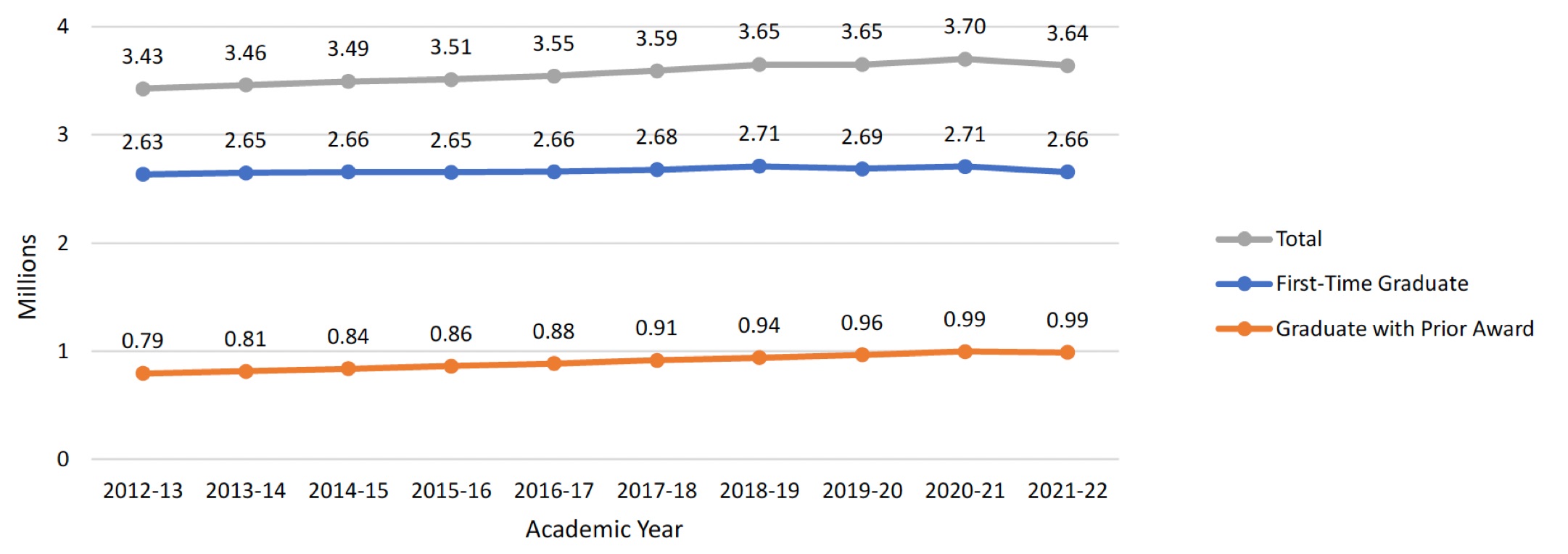- BLOG HOME
- »
- Signature Reports
- »
- Undergraduate Credential Earners Decline for the First Time in a Decade

Undergraduate Credential Earners Decline for the First Time in a Decade
Undergraduate credential earners declined for the first time in a decade (-1.6% or -58,800 graduates from the previous year), according to a new report by the National Student Clearinghouse Research Center. A total of 3.6 million people earned an undergraduate-level credential during the 2021-22 academic year, a new low not seen in four years (see Figure 1).
The Undergraduate Degree Earners report demonstrates that the decline was caused by an unprecedented one-year loss of first-time graduates (-1.9% or -50,700), accounting for 86.2% of the overall decline. This marks the largest decline in first-time graduates since 2012-13, for which we have the data available. Graduates with a prior award also fell but at a smaller rate than first-time graduates (-0.8% or -8,100). As a result, first-time graduates are a declining share of the overall undergraduate credential earners, comprising 72.9% in 2021-22.
“The pandemic’s impact on higher education has gone beyond the declining numbers of current students and is now showing up as a drop in the annual number of new graduates as well, taking it all the way back to the level of 2016-17,” said Doug Shapiro, Executive Director of the National Student Clearinghouse Research Center. “This is a setback to those seeking higher postsecondary attainment rates, leaving the nation and many states falling further behind on goals for a highly educated workforce.”
Other key findings:
- Among first-time graduates, associate degree completions fell sharply (-7.6% or -56,800), followed by baccalaureate recipients (-2.4% or -36,000). First-time bachelor’s degree earners fell for the first time in a decade. In contrast, first-time certificate completers grew considerably (+9.0% or +42,200).
- Declines are particularly steep among first-time graduates 25 years and older (-4.1% or -30,600). Declines are smaller among graduates 24 years and younger (-1.0% or -19,100).
- Baccalaureate earners who had a prior associate degree decreased (-2.5% or -11,600), after having steadily grown over the past eight years. It has caused the overall non-first-time graduate numbers to slide for the first time in a decade (-0.8% or -8,100).
The Undergraduate Degree Earners report series, published annually, provides demographic and educational profile data for all students graduating with an undergraduate credential each year. Undergraduate credentials may include associate and bachelor’s degrees and certificates. In the current report, we profile graduates in the 2021-22 academic year, with a focus on first-time versus non-first-time graduates, and changes in demographics and education credentials received since the 2012-13 academic year. The Appendix provides state-level and regional trends, in addition to the national graduate profiles by age and type of credential received.
Overall Undergraduate Credential Earners

“This is a setback to those seeking higher postsecondary attainment rates, leaving the nation and many states falling further behind on goals for a highly-educated workforce.”
Doug Shapiro
Executive Director, National Student Clearinghouse Research Center
Additional Resources:



